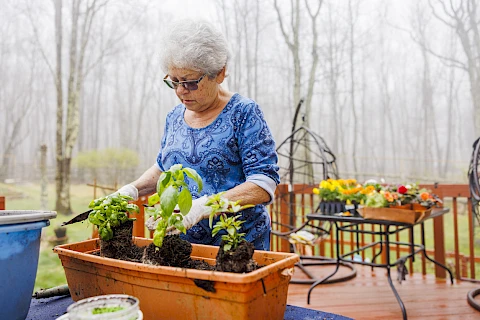
Gardening is a beloved hobby for many seniors. It's a way to stay active, connect with nature, and enjoy the satisfaction of growing something beautiful or delicious. However, traditional gardening can present some challenges for seniors with limited mobility. Today, we'd like to draw upon our experience helping caregivers adapt gardening activities, making them accessible and enjoyable for seniors with mobility issues.
The Benefits of Gardening for Seniors
Gardening does more than beautify a landscape or put fresh, flavorful food on the table. It rewards the gardener with all-around good health.
Gardening offers numerous physical health benefits. It is a light form of exercise that can improve strength, flexibility, and coordination. Sunlight also helps the body produce vitamin D, which is important for bone health.
Gardening is soothing and can reduce stress and anxiety. The act of nurturing plants can give seniors a sense of purpose and accomplishment, boosting their mood and overall well-being.
Gardening can also be a social activity. Participating in community gardens or gardening clubs allows seniors to interact with others, combating feelings of loneliness and isolation.
Assessing Mobility and Needs
Before starting, get a good understanding of the senior's physical limitations. Every individual's abilities and mobility levels are different, so a personalized approach is necessary. Consulting with healthcare professionals like doctors or occupational therapists can provide valuable insights into what types of activities are suitable and how to adapt them safely. Choose gardening tasks that match the senior's abilities. This might involve simplifying tasks or offering more support during activities.
Modifications for Accessible Gardening
Gardening can be made easier for seniors with the right garden setup and equipment.
Raised Garden Beds
Raised beds are great for seniors with limited mobility. They reduce the need to bend or kneel, making gardening more comfortable. Raised beds come in various materials, such as wood, metal, or plastic. Choose a sturdy material that fits the garden's aesthetics.
Position raised beds at a height that is easy for the senior to reach. Ensure they are wide enough to allow for comfortable planting and maintenance but not too wide to access all areas easily.
Container Gardening
Container gardening is versatile and can be done on patios, balconies, or even indoors. It allows for easy customization of plant placement. Select lightweight containers with good drainage. Ensure they are the appropriate size for the plants being grown. Place containers in easily accessible locations. Ensure they are at a height that eliminates the need for bending. Maintain with regular watering and feeding as needed.
Ergonomic Tools and Equipment
Ergonomic tools are designed to reduce strain on joints and muscles, making gardening easier for seniors with limited mobility. Look for lightweight tools with cushioned grips. Tools like long-handled spades, trowels, and pruners can reduce the need to bend or reach.
Ergonomic tools are available at most garden centers, hardware stores, and online retailers specializing in senior-friendly products.
Creating a Safe and Comfortable Gardening Environment
Here are some quick tips to empower seniors with limited mobility to keep enjoying their gardening hobby:
- Pathways and accessibility: Ensure paths are wide, flat, and obstacle-free. Use non-slip materials for added safety.
- Seating and resting areas: Provide comfortable seating and resting areas where seniors can take breaks. Benches or shaded seating can make the garden more enjoyable.
- Proper lighting and shade: Ensure the garden is well-lit, especially if the senior enjoys evening gardening. Provide shaded areas to protect from excessive sun exposure.
Adapting Gardening Techniques
Use tools like seed dispensers and weed pullers to make planting and weeding easier and less strenuous. Consider installing a drip irrigation system or using lightweight hoses with easy-to-use nozzles to reduce the effort required for watering. Use natural pest deterrents like companion planting or lightweight insect netting to control pests without the need for heavy chemicals or physical traps.
Community Resources and Support
Encourage participation in local gardening clubs or groups. They provide social interaction and valuable gardening tips. Look for workshops and classes tailored to seniors. These can teach new skills and adaptations for accessible gardening. Numerous online resources and forums offer advice on accessible gardening. They can be a great way to learn and connect with others.
Enjoy Gardening With Senior Helpers
With the right modifications, gardening can still be a fulfilling activity for seniors with limited mobility. If you need additional help at home, whether it's with personal care, meal preparation, or even assistance in the garden, Senior Helpers of Bolingbrook is here for you. If you live in Bolingbrook, Crest Hill, Joliet, Lockport, or Romeoville, contact us to learn more about our comprehensive in-home and companion care.